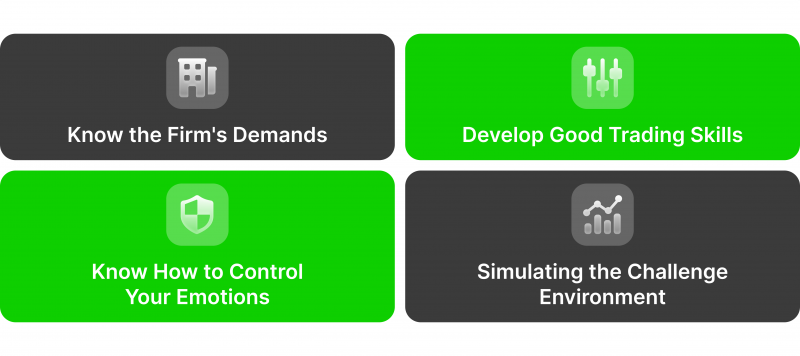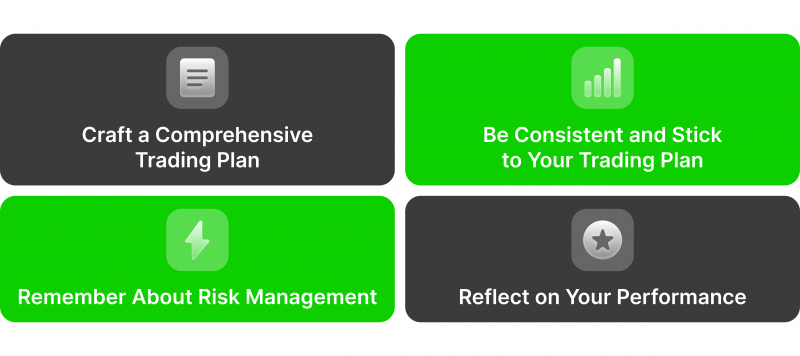What Are Prop Trading Firms? How to Pass Prop Trading Challenge?

Those who aspire to be trusted with large volumes of funds by prop firms must be prepared to take on the ultimate test—the prop trading challenge. In recent years, the market has seen a surge in new prop trader firms, each presenting a unique take on this rigorous evaluation process.
What does it take to go through this evaluation stage? In September 2023, Forex Prop Firm published their challenge passing rates, revealing that only 10.59% of participants were able to pass the first level, and a mere 9.26% qualified for the advanced pro level. So, how to pass the prop trading challenge and secure your chance to trade with a prop firm’s capital?
Key Takeaways
- The prop trading challenge is a tough screening process for testing a trader’s ability to trade a firm’s capital.
- To pass the testing stage, know the requirements of the company, develop a trading plan and stick to it consistently.
- Succeeding in the challenge offers advanced trading tools and favourable terms.
The Landscape of Prop Trading
Proprietary trading companies are specialised organisations that allocate their own funds to traders, allowing them to trade currencies and other assets with the firm’s resources. These companies earn their money primarily from the gains made by traders, who are given the possibility to leverage the firm’s capital in order to maximise their gains.
The prop trading space is still relatively young, having emerged in the past decade. However, the concept of trading prop firms is actively gaining traction in the forex market. This industry reached $6.7 billion in 2020 and continues to grow rapidly today.
Proprietary trading desks are often found in institutions such as brokerage firms and hedge funds. However, there are regulations in place to restrict large banks from participating in prop trading activities, which aim to prevent excessive risk-taking that can lead to financial crises such as the 2007-2008 global recession. This is done to protect both the institution and the overall stability of the financial system.
Moreover, regulatory bodies such as the ESMA are considering implementing stricter measures to ensure responsible and legal prop trading practices by other institutions.
The restrictions on proprietary trading by large banks were put in place through the Volcker Rule, a provision of the Dodd-Frank Wall Street Reform Act passed in response to the 2007-2008 financial crisis.
What Is a Prop Trading Challenge?
Becoming a funded trader includes the prop trading challenge, a tough test that assesses a trader’s capabilities and suitability for the firm. Proprietary trading companies do not simply hand over their capital to random traders; instead, they have a strict selection procedure that usually involves various stages of the trader’s assessment process.
The assessment entails reaching a defined profit target while complying with strict risk parameters established by the firm. These include drawdоwns, position sizing guidelines, and trading restrictions on certain instruments or strategies. Such challenges test trading abilities, risk management competencies, and emotional discipline, ensuring that only the most competent individuals are allowed to manage the firm’s funds.
Although some companies might offer single-stage evaluations or even bypass them entirely, such cases are rare exceptions. Typically, you should anticipate dedicating between weeks to months for this phase and adjust your schedule accordingly.
Key Considerations Before Taking on the Challenge
Overcoming a challenge is no easy feat, as the firms are seeking to identify the top performers of the trading community. Here are some critical factors to consider:
Have a Question About Your Brokerage Setup?
Our team is here to guide you — whether you're starting out or expanding.
Sharpen Your Skills
To achieve great results, you’ll need to gain proficiency in technical analysis, stress management, and emotional control. Grasp the rhythm of market trends, identify graphical patterns, and effectively use indicators to spot profitable trades.
Know the Firm’s Demands
Before diving in, take a moment to thoroughly research the firm’s trading criteria. Comprehend their profit targets, permitted instruments, and rules. This understanding will aid in adjusting your strategy in line with their expectations.
Recreate the Challenge Situation
Make use of a demo account or trading simulator to mimic the challenge environment. Refine your strategies, assess your decision-making capabilities, and familiarise yourself with trading conditions. Approach these practice sessions with the seriousness it deserves.
Master Emotional Control
Trading under pressure can be emotionally taxing, and a prop challenge only intensifies these emotions. Employ techniques such as mindfulness, maintaining a trading diary, and seeking advice from veteran traders to help handle your emotions.

In response to MetaQuotes’ crackdown on proprietary trading, the most popular prop firm, FTMO, and several others have decided to no longer accept new clients from the United States.
How to Pass the Evaluation Stage?
Passing a challenge requires thorough preparation, discipline, and a solid trading plan.
Step 1: Craft a Thorough Trading Plan
A sound trading plan is the key to success in trading, and tests of prop companies are no exception. This plan should detail your strategy, including entry and exit points, risk management protocols, and daily or weekly trading objectives. Your plan must be thorough, specific, and adaptable to various market conditions.
Step 2: Be Consistent with Your Actions
Consistency is key during the challenge. Follow your trading plan diligently and refrain from making impulsive trades. Remember, the goal is not just to earn profits — it is also to demonstrate a solid grasp of financial markets. Stay disciplined and focused on your objective.
Step 3: Remember About Risk Management
Managing risks in proprietary trading includes position sizing, setting stop-losses, assessing your risk-reward ratio, diversifying your trades, and controlling emotions. Implementing solid risk management is not only essential for passing the certification, but also making you a successful trader in the long run.
Step 4: Reflect on Your Results
Upon completing the trading challenge, take time to review and reflect on your progress. Assess what worked well and what didn’t, and most importantly, understand the reasons behind these outcomes. This reflection helps you learn from your experiences, refining your trading plan for future challenges or real-world trading scenarios.

How to Choose a Prop Trading Firm
Choosing a prop trading firm involves weighing several key factors. Listed below are some tips on how to find the perfect match for your trading goals:
Analyse the Conditions and Price Models
The initial step is to explore the different choices available. There are plenty of internet sources which offer a comprehensive database of trading firm profiles.
Once you are familiar with your options, it’s time to dig deeper into their key trading conditions. Assess how well the offerings of each company correspond to your trading style and needs. Prop companies normally offer capital plans ranging from $10,000 to $100,000 and more at a cost of $50 to $500.
Some companies exclusively offer futures trading, while others provide access to forex, cryptocurrencies, stocks, and various other assets. It’s important to carefully examine conditions related to profit targets, leverage, and any other factors that are pertinent to the trader’s risk appetite.
Examine Challenge Details
Meticulously scrutinise the terms of the challenge. Make sure you pay attention to the different stages involved in the evaluation process, which may include trading on demo accounts, interviews, or other specified requirements. Assess conditions such as the cost, profit targets, and whether there is an option for reevaluation without additional charges.
Take into Account Profit-Reward Ratio
Leading prop trading firms usually provide profit splits ranging from 70/30 to 90/10%, favouring the trader. As your capital and productivity increase, you might gain extra privileges. While high ratios significantly benefit your returns, you should thoroughly assess the firm, taking all pertinent factors into account.
Discover the Tools That Power 500+ Brokerages
Explore our complete ecosystem — from liquidity to CRM to trading infrastructure.
Examine Reviews and Feedback
Some insights can only be provided by traders who have prior experience with the company. Look for traders who have worked with the prop trading firm you’re considering and seek their advice on critical factors to be aware of, such as management style, company culture, and other insider tips.
Only 1% of prop traders maintain their funded account open for a significant period of time.
Is It Worth It?

The apparent benefit of getting involved with a prop firm is the access to generous capital. This arrangement empowers proficient traders to handle larger stakes, expanding their diversification potential and possibly yielding greater returns compared to when they use personal assets.
The financial risk is lessened significantly when trading with a prop firm, as the company provides the necessary funding. The setup allows traders to hone their craft without the additional stress of safeguarding their own money.
Moreover, such firms also have appealing revenue-sharing programs in place, aligning the traders’ goals with those of the company. This arrangement creates the prospect of substantial profits, depending on the trader’s ability to consistently generate profits.
Finally, proprietary firms provide privileged access to superior tools and resources, enhancing their skills and decision-making abilities. Thanks to investments in state-of-the-art platforms, analytics, and research, these firms deliver advanced solutions that can significantly boost results. It also promotes mentorship and networking, giving traders a chance to gain insight from experts and form alliances for future endeavours.
Closing Thoughts
Remember, trading evaluations are not for the faint of heart but for those who possess the technical expertise, emotional discipline, and unwavering determination to thrive in a pressure-filled environment. Embrace this challenge as an opportunity to showcase your skills, refine your trading tactics, and embark on a rewarding career path.
FAQ
Is prop trading a good career path?
Prop trading can be a good career for those who are dedicated, disciplined, and have a deep understanding of financial markets. It requires considerable skill and risk management abilities to succeed in this fast-paced and competitive environment. However, it is not suitable for everyone, as the pressure and risks involved may not be appealing to some individuals.
Is prop trading illegal?
No, it is not illegal. However, certain firms may have business practices or terms of service that could be deemed illegal by regulators. In recent months, there have been discussions by organisations such as the ESMA around regulating such activities.
Is it possible to use a trading bot to pass prop firm challenge?
Yes, most prop companies allow the use of trading bots as long as they are used within the rules set by the company. Be sure to read the guidelines carefully before using a bot in the evaluation phase.
Do evaluation phases take a long time to pass?
The timeline for passing and qualifying as a funded trader is usually 4-5 months. However, it’s necessary to bear in mind that becoming an effective trader beforehand is not a quick process.
Are there any trading prop firms that don't require challenge?
Yes, some firms do not require individuals to undergo testing. However, assessment stages can be beneficial as they demonstrate a firm’s dedication to maintaining a high standard of trading.








